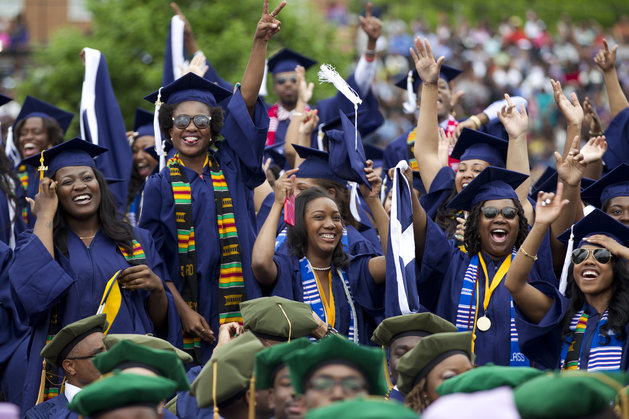In 1837, the first HBCU, Cheyney University of Pennsylvania was founded. Richard Humphreys, a silversmith and quaker philanthropist, allocated $10,000 of his estate to establish more educational opportunities for African Americans. Since the founding of Cheyney University, HBCUs have become a vital source of accomplishment and pride for African Americans. The self-determination and principal mission to serve African Americans with equitable opportunities would continue into the 20th century.
The 1965 Watts riots were an uprising of looting-protests to end police brutality against African Americans, housing discrimination, and racial barriers preventing our access to education and employment. After six days of unrest, informed change took place such as constitutional amendments, public awareness from civil rights leaders, and more importantly, — an African American holiday.
In the aftermath of the Watts uprising, professor and author, Maulana Karenga created Kwanzaa in 1996, — with the intended goal of providing an existing holiday alternative to Christmas for African Americans. The name Kwanzaa derives from the Swahili phrase matunda ya kwanza, meaning “first fruits of the harvest”. Karenga also wanted Kwanzaa to be an opportunity for us to celebrate ourselves and our history, rather than imitating the practice of the popular holidays.
Kwanzaa is observed annually from December 26 — January 1 and celebrates the Seven Principles of African Heritage centered on purpose, identity and unity.
Kwanzaa Seven Day Principles
- December 26: Umoja (Unity): To strive for and to maintain unity in the family, community, nation, and race.
- December 27: Kujichagulia (Self-determination): To define and name ourselves, as well as to create and speak for ourselves.
- December 28: Ujima (Collective work and responsibility): To build and maintain our community together and make our brothers’ and sisters’ problems our problems and to solve them together.
- December 29: Ujamaa (Cooperative economics): To build and maintain our own stores, shops, and other businesses and to profit from them together.
- December 30: Nia (Purpose): To make our collective vocation the building and developing of our community in order to restore our people to their traditional greatness.
- December 31: Kuumba (Creativity): To always do as much as we can, in the way we can, in order to leave our community more beautiful and beneficial than we inherited it.
- January 1: Imani (Faith): To believe with all our hearts in our people, our parents, our teachers, our leaders, and the righteousness and victory of our struggle.
A poll study from Public Policy provided that at least 4% (an estimated 12.5 million) of Americans celebrate Kwanzaa during the holiday season. Since its founding in 1966, the annual week-long celebration has grown in popularity.
Despite statistics providing varied estimates of participants, Kwanzaa is an official holiday and its vital impact continues to manifest within the African American community. During Kwanzaa, families and communities unite to feast, honor the ancestors, affirm the bonds between them, and celebrate African American culture.
Each day they light a candle to highlight the principle of that day and to breathe meaning into the principles with various activities.
Moreover, the principles of Kwanzaa share a deep-rooted connection to that of the nearly 200 year old history and culture of Historically Black Colleges and Universities.
Historically Black Colleges & Universities have played an instrumental role in the unity and celebration of African Americans. The HBCU mission, like the creation of Kwanzaa, advocates primarily for African Americans; – seeking to uplift our purpose and remove discriminatory barriers necessary to our access and freedom.
HBCUs continue these efforts today, organizing fundraising initiatives for students, collaborating to address key issues prevalent to the HBCU community, and celebrating our culture through music, dance, sports, and art.
The first HBCUs established in the 18th century were a self-determining effort in the Black community. The mantra, ‘making something out of ourselves’ is a constant key in our strive for education, equality, and empowerment. HBCUs continue to represent the unfailing commitment to creating our own power.
Much like an HBCU, Kwanzaa was created with equitable access for African Americans in mind. With now over 100 in over 20 states, HBCUs’ relevant impact has been and will always be a vital resource in how we celebrate and recognize our history, culture, and legacy.
To learn more about Kwanzaa and how you can commemorate the holiday, please visit The Official Kwanzaa Website.



